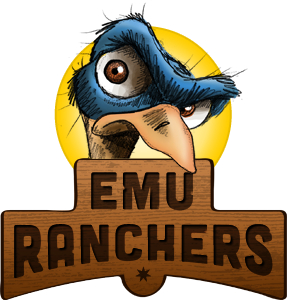
The Basics:
- For ages 6 and up (publisher suggests 8+)
- For 2 players
- Approximately 15 minutes to complete
Geek Skills:
- Counting & Math
- Logical & Critical Decision Making
- Pattern/Color Matching
- Hand/Resource Management
Learning Curve:
- Child – Easy
- Adult – Easy
Theme & Narrative:
- Raise emus and do your best to make the hard work profitable!
Endorsements:
- Gamer Geek mixed!
- Parent Geek approved!
- Child Geek approved!
Overview
Traditional ranching is so “yesterday”. The economy is ready for risk taking entrepreneurs (such as yourself) to blaze new trails into the lands of agribusiness! The emu, an ugly flightless bird with legs and claws strong enough to take down an armored lion, is your ticket to wealth! The only problem is that emus are exceedingly picky. If you raise them right, you stand to gain a lot. Raise them wrong and you’re sure to meet with economic disaster. Good luck!
Emu Ranchers, designed by P. D. Magnus, is a freely available game that uses the Decktet game system. It’s also a game now available from AppSauce Laboratories as a standalone card game that does not require the Decktet cards. This is the version being reviewed here. The game is comprised of 24 Emu cards, 6 Egg cards, 6 Feather cards, 4 Wild cards, and 1 Buyout card for a total of 41 cards. The artwork on the cards is colorful and well-done. The cards are made of typical cardstock quality found in most card games. Not included with Emu Ranchers, but necessary to play, is a pen or pencil and a piece of paper to keep track of the players’ scores.
Game Set Up
Note: There are two ways to play Emu Ranchers: the Basic game and the Advanced game. The Basic game set up and game play is described here. See the “Game Variant” section of this review for Advanced game play details.
To set up the game, first separate the Emu, Egg, and Feather cards from the Wild and Buyout cards. The Wild and Buyout cards are not used in the Basic game and should be placed back in the box.
Second, shuffle all the cards together and deal 6 to each player, face-down. Players should look at their cards, but keep them hidden from their opponent at all times.
Third, place the remaining cards face-down in a single deck in the middle of the playing area. This is the draw deck. Leave room next to the draw deck for a discard pile.
That’s it for game set up! Let’s raise some emus!
Emu Ranching 101
Before any player should think seriously about becoming an emu rancher, they best learn a bit about the bird they are raising.
Emu Cards
The Emu cards represent the ill-tempered birds the players are attempting to raise to make a profit. Regardless of how the players hold the cards in their hand, the “top” of the card will show the number value (used in scoring and card placement), the color it can be matched to, and the color of the number value found at the bottom of the card. Note that those who have difficulty distinguishing colors can use the symbols found on the card’s colored border located at the top and bottom of the cards to help make matches from their hand to the table.
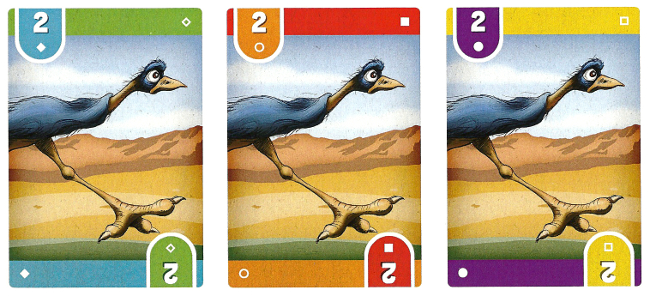
Feather and Egg Cards
The Feather and Egg cards have the same colors and symbols found on the Emu cards, but use an “Egg” and “Feather” instead of a number value. Eggs are consider a “1” and Feathers is considered a “10”. Egg and Feather cards are always one color, regardless of card orientation in a player’s hand.
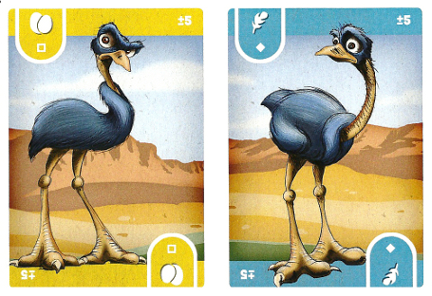
Buyout and Wild Cards
As the name suggests, Wild cards can represent a variety of colors and any number except those reserved for the Egg and Feather cards. This means the Wild card can represent any number value no smaller than a “2” and no larger than a “9”. Each Wild card can be any one of three possible colors, which are identified in a stripped color formation or by quickly looking at the symbols found on the card’s colored border. The Buyout card is used to remove cards from the player’s scoring area at the end of the game. The Wild and Buyout cards are only used in the Advanced game.
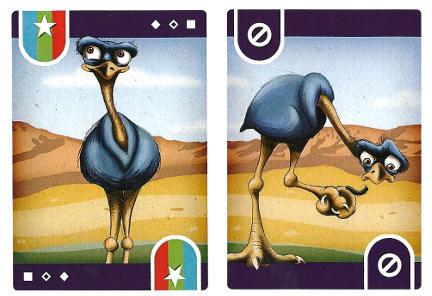
Down on the Emu Ranch
Emu Ranchers is played in a set number of rounds. The number of rounds is determined by the players prior to playing the game. Normally, the number of rounds played are even (for example, 2, 4, or 6 rounds of play). During a single round, players will take turns in turn order sequence. A player’s turn is comprised of 2 steps and is summarized here.
Step 1: Play a Card
During this step, the player can take 1 of 3 different actions. When playing a card, they are placed face-up in front of the player in columns. These columns are referred to as “Emu Pens” in the game. There is no limit to the number of Emu Pens a player can have in front of them.
Start a New Emu Pen
The player places an Emu, Feather, or Egg card down in front of them, face-up. This card is not placed in an existing Emu Pen (cards already played to the table). A new Emu Pen will penalize the player -18 points at the end of the round if not enough Emu cards are played to it. It’s therefore in the player’s best interest to keep the number of Emu Pens in front of them down to a reasonable number that can be managed. But, as we will learn, every Emu Pen can only hold so many emus. A player must risk loosing points in order to obtain them.
Play Card to Existing Emu Pen
The player places an Emu, Feather, or Egg card, face-up, to an existing Emu Pen started by them on a previous turn. When adding a card, it’s placed so the cards cascade downward in the column, with the new card slightly overlaying the old. Players should make certain the numbers on the cards are always visible in every Emu Pen they are managing.
There are a few rules would-be emu ranchers need to follow when playing cards to existing Emu Pens.
- All cards in an Emu Pen must have the same color as the first card that started the Emu Pen. The color that is matched to is the one with the number (or egg or feather) found on the card’s upper left-hand corner.
- The new card placed must have a higher or lower number than all the cards in the Emu Pen that came before it.
The number values deserve a bit more explanation. When the player starts a new Emu Pen with an Emu, Feather, or Egg card, they have set the Emu Pen’s starting number value. The next card that is played to the Emu Pen must be either HIGHER or LOWER than the first card played while still matching the same color. Additional cards played to the same Emu Pen must follow the ascending or descending number values (low to high or high to low). For example, if the first Emu card played was a “2” and the next Emu card played was a “5”, all future cards played to the Emu Pen must be HIGHER than the last card played to the Emu Pen. In this case, a “5”. That means the next card could be any number value ranging from “6” to “10” as long as it matched the Emu Pen color.
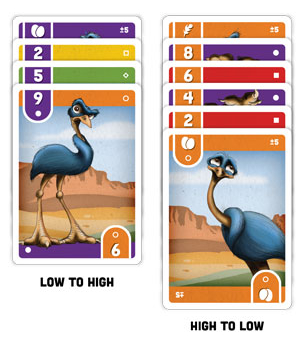
When a new Emu Pen is started by an Emu card, the number is set, but not the color. The next Emu card played to it locks the color per the color match made . The initial Emu card played that established the Emu Pen is then rotated accordingly, with the Emu Pen color noted at top. If the next card played to a newly created Emu Pen matches BOTH colors of the initially placed Emu card, the color is not yet locked, but the number order must be maintained regardless of the next color played. Egg and Feather cards lock the color of the Emu Pen when first played.
Discard Card
If the player likes, they can take any 1 card from their hand and place it, face-up, to the discard pile. Players should be careful what they discard or they might inadvertently assist their opponent.
Step 2: Draw a Card
After taking one of the actions noted above in step 1, the player can take 1 card from the draw deck or take the top most card on the discard pile. Note that a player can only take the top card on the discard pile if they did not discard during step 1.
This ends the player’s turn. The next player in turn order sequence now goes starting with step 1 noted above.
Ending a Round and Scoring
The round ends when the last card is taken from the draw deck during step 2 of a player’s turn. All the players now play any remaining Emu cards they might have in their hand to EXISTING Emu Pens. Players cannot start a new Emu Pen at this time. Any cards that cannot be played are placed in the discard pile. Players now count their points.
In Emu Ranchers, the intent is to create profitable Emu Pens. The cost of every Emu Pen (column) the player has before them is 18 points. The player now removes Emu cards from their Emu Pens, adding their number values together, in hopes of being able to count at least 18 points. Emu cards used are REMOVED from the Emu Pen and no “change” is provided. For example, if a player has to remove a number of Emu cards where the total number is over 18, they do not get the difference back. Thematically speaking, the player is paying for the work done that created the Emu Pen in the first place using the emus that it holds. Egg and Feather cards cannot be used to pay for the Emu Pen.
- If the player is unable to remove enough Emu cards from their Emu Pen so the total number value of the removed cards is at least 18 or HIGHER, the Emu Pen is not profitable. The player is penalized -18 points for the round. In addition, for every Egg and Feather card in the unprofitable Emu Pen, an additional -5 points are added to the player’s overall score.
- If the player is able to remove enough Emu cards from their Emu Pen so the total number value of the removed cards is at least 18 or HIGHER, the Emu Pen is profitable. The number values of any remaining cards in the Emu Pen are added together and are recorded as part of the player’s score. In addition, for every Egg and Feather card in the profitable Emu Pen, an additional +5 points are added to the player’s overall score.
The above is repeated for every Emu Pen the player has. In order to help keep track of the points, we suggest that each player count their Emu Pens one at a time. Once a player has finished calculating their points for the round, the next player in turn order sequence should calculate their points.
Ending and Winning the game
After the established number of rounds have been completed, the game comes to an end. All the points scored by the players for each of the rounds are added together and the player with the most points wins the game. If both players have negative points, the player with the least negative value wins. For example, if one player had -10 points and another player had -8 points, the player with the -8 points wins the game.
Game Variant
The Advanced game has a few different rules, but the overall game play is the same as the Basic game.
- When setting up the game, use all the cards (Emu, Feather, Egg, Wild, and Buyout cards).
- The value of a Wild card when determining the profitability of the Emu Pen is based on the Wild card’s position in the column to the next highest numbered Emu card. Whatever that number value might be, the Wild card’s value is one less. For example, if the next highest Emu card is “5”, the Wild card value would be “4”. In this way, the maximum value of any Wild card is “9”. Wild cards can be used when paying for the Emu Pen.
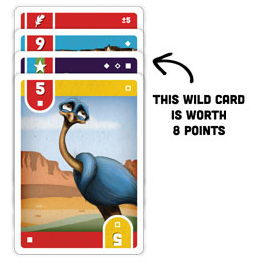
- The Buyout card can be used to remove 1 unprofitable Emu Pen in front of the player during end of round scoring. The Buyout card and all the cards in the unprofitable Emu Pen are discarded. The player is not penalized any points.
House Rule
If playing with an inexperienced player or a younger player, I suggest you give them the Buyout card and then deal them 5 cards during game set up. Do this regardless if you are playing the Basic or Advanced game. This allows the player an opportunity to avoid disastrous card plays while they learn the game. Continue to give the Buyout card to the new player until such time they feel comfortable with how the game is played and scored. I also suggest you use all the cards right from the start. There is no discernible difference in game play difficulty between the Basic and the Advanced game play other than simply more cards.
To learn more about the Decktet game system, see the official website and the wiki. The game license allows you to print off your own copy of the deck if you like. To learn more about AppSauce and it’s version of the game, visit the AppSauce Labratories website. You can also play the game free online if you so choose.
Prediction
Our groups and I have played Emu Ranchers before using the Decktet game system. When we reviewed the game system a little more than a year ago, Emu Ranchers was one of the games we played to stress test the game system’s rules and flexibility. The game met with mixed results then and I’m sure it’ll meet with mixed results this time around, too, but this version has an advantage. With the Decktet game system, players had to use generic symbols to help represent specific aspects of the game. Not the case with this version of Emu Ranchers. The cards and icons are all thematic and the colors are crisp and solid. The cards are also exceedingly less “busy” and that should make game play go a bit faster. Not that Emu Ranchers is a slow game, mind you. Even when we played it with the Decktet game system, it was found to be a quick game to learn and to play. I predict Emu Ranchers will meet with solid approvals from the Child and Parent Geeks, with the Gamer Geeks giving it a mixed approval at best.
Teaching Emu Ranchers is a simple task. Just demonstrate how the cards are matched, Emu Pens are populated, and how scoring takes place at the end of the round. If you have to focus on one specific aspect of the game play, it’s the end of the round scoring. Make sure all the players understand that you do not count all the cards in an Emu Pen and subtract 18 to get your score. Players REMOVE cards until they have 18 or more points. Whatever is left is counted as points for the Emu Pen. If you don’t make that clear, some players will get pretty upset with you.
And so, after reintroducing the game to my two oldest Child Geeks, I asked them their thoughts on Emu Ranchers so far.
“Yep, I remember playing this. These cards are much better and make it easy to recognize the points and colors.” ~ Liam (age 9)
“Oh, I remember this game, too! I liked it!” ~ Nyhus (age 6)
Both of my little geeks are ready to play. Let’s wrangle up some emus and see if we can make a profit or this game was a bad time investment.
Final Word
The Child Geeks had a great time with Emu Ranchers and players as young as 6-years-old were able to play the game by themselves and make a profit off their Emu Pens. The youngest of our players needed some help with the scoring, but they did everything else themselves. This included the hand management and the cards they selected to play or discard. All the Child Geeks thought the game was fun and fast. Some were a bit frustrated at times with the scoring (they really didn’t like it when their Emu Pens were found to be below the 18 point mark), but the Child Geeks were always able to do “something”, which they really liked. None of the Child Geeks became confused or lost while playing the game, but a few of them were more than a little disappointed when their Emu Pens didn’t payout. I observed, on several occasions, what I would consider poor choices. Many of the Child Geeks created too many Emu Pens when they first started playing the game which they could not hope to make profitable. It took about 2 games per Child Geek before they became much more frugal with their Emu Pen placement. All the Child Geeks voted to approve the game.
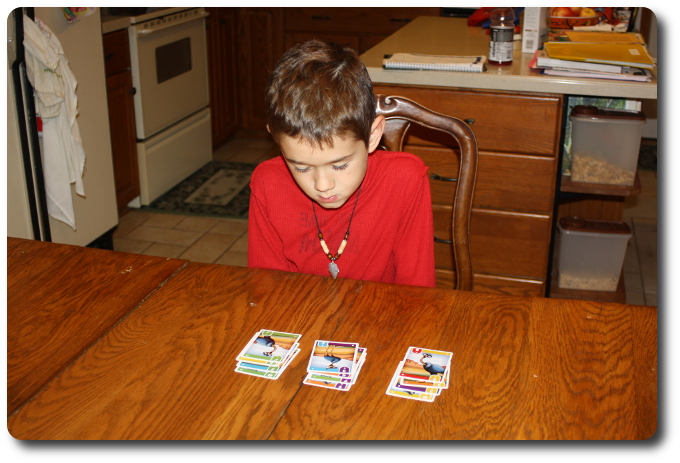
My little geek reviews his Emu Pens at the end of the round
The Parent Geeks found Emu Ranchers to be an enjoyable 2-player game with both their family and friends. It didn’t get any points for being a game you could play with another couple (only 2-players allowed), but the Parent Geeks have always enjoyed a casual game that could be played with their children or spouses. Lots of games can be played with only 2-players, but it’s often times obvious when the game was not necessarily designed with only 2-players in mind. Not the case with Emu Ranchers. The game plays very well, is challenging, engaging, and best of all, fun for the Parent Geeks. According to one Parent Geek, “I really like this card game. It’s easy to learn, fun to play, and always leaves me with a smile.” All the Parent Geeks voted to approve the game.
A number of Gamer Geeks thought Emu Ranchers was an excellent casual game that provided enough of a challenge to be engaging. The Gamer Geeks who did not care for Emu Ranchers thought it felt like a 2-player solitaire game, lacked any opportunity for tactics or strategy, and was really clunky when it came time to score the round. According to one Gamer Geek, “This would be a great game if I was a kid or a gamer who didn’t’ know any better.” A bit harsh, I would say. Another Gamer Geek said, “The game is solid, plays fast, plays well, and is a fun 2-player game. I give it my thumbs-up because it does what it was made to do.” In the end, it all depended on how the Gamer Geek defined their own subjective definition of a game’s value. Some believed if a game did exactly what it was designed to do, it was worth cheering for. Others believed that a game as only worth getting excited about if it actually created excitement.
You’ll find some Gamer Geeks stating that Emu Ranchers is a knockoff of Lost Cities. While they are very similar in game play and scoring, I find Lost Cities to be a more complicated and fulfilling game. If I owned Lost Cities (which I sadly do not), I would play it over Emu Ranchers without hesitation. So one must ask why Emu Ranchers exists in the first place if it so close to another and more widely approved game that uses the same rules and game play? The answer is simple: it’s a clone. Taken from the Emu Ranchers original website….
This game was inspired by Jeff Warrender, who suggested playing something like Reiner Knizia’s Lost Cities with the Decktet.
The original Emu Ranchers was designed to use the Decktet game system, which I am a HUGE fan of. Without a doubt, the existence of Emu Ranchers proves how versatile the Decktet game system is, but I don’t believe the intent of Emu Ranchers was to dethrone or compete with Lost Cities. I am of the opinion that Emu Ranchers exists only to demonstrate what can be accomplished using the Decktet game system and game components. Does that make it a bad or unnecessary game? Certainly not.
But I will say this about Emu Ranchers: it works. The only aspect of the game I find clunky is the scoring which always feels much more involved than the game warrants. The overall game play is quick and very well paced. Then you come to scoring and the game drops from 60 miles per hour to an exceedingly painful 5 miles per hour. It can be a bit jarring at first, but easily forgotten when you are playing against an opponent who is having fun. I think there are better 2-player games available today (one of which I have already mentioned), but Emu Ranchers will no doubt entertain the Child Geeks and the Parent Geeks. The Gamer Geek in me hungers for a card game with a bit more substance.
This game was given to Father Geek as a review copy. Father Geek was not paid, bribed, wined, dined, or threatened in vain hopes of influencing this review. Such is the statuesque and legendary integrity of Father Geek.



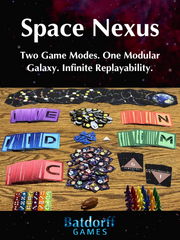
Pingback: Decktet Game System Review » Father Geek
If your scoring explanation is correct then it differs from the Dectet version. And it’s a BIG difference. In the Dectet version you do not lose 18 points for a nonprofitable bird (pen). You lose the DIFFERENCE between the cost (18) and how much you actually have invested. So if you have only 15 points in play for one bird, you lose 3 points (18-15=3)